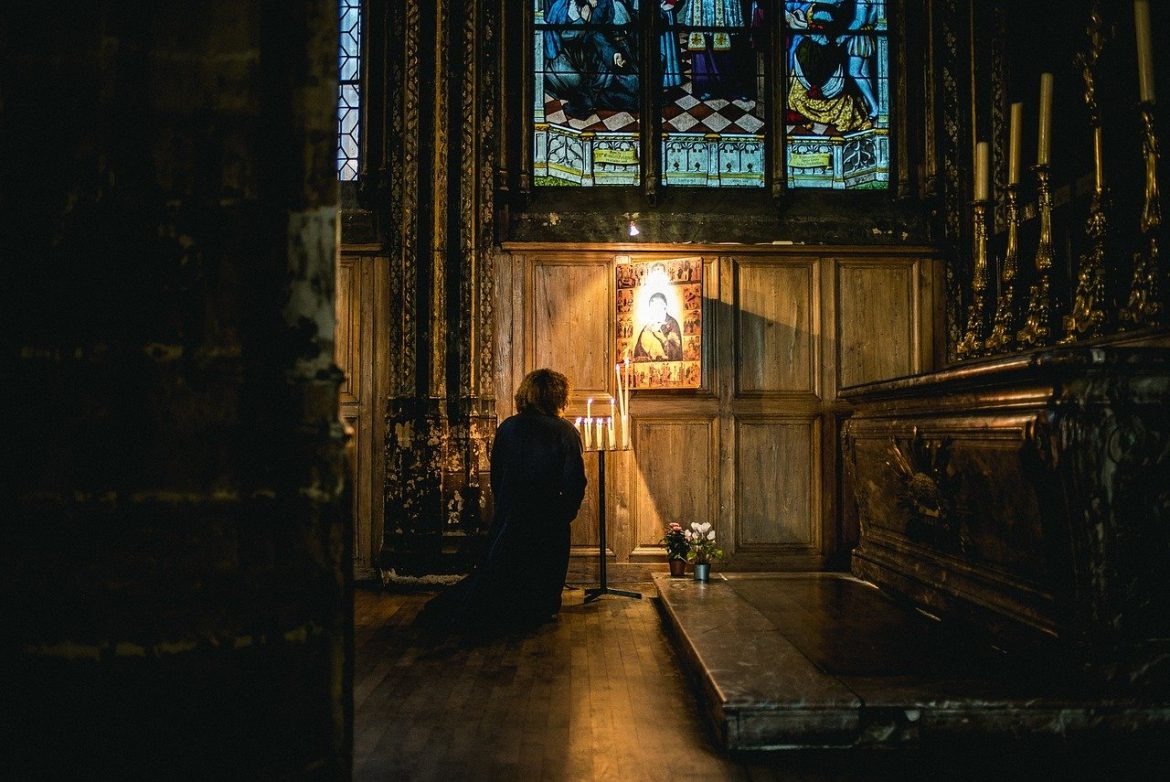Here is another beautiful rendition of the Lord’s Prayer by Francis McNab that I think is particularly appropriate for today.
Dear One, closer to us than our own hearts, farther from us than the most distant star, you are beyond naming.
May your powerful presence become obvious not only in the undeniable glory of the sky, but also in the seemingly base and common processes of the earth.
Give us what we need, day by day, to keep body and soul together, because clever as you have made us, we still owe our existence to you.
We recognize that to be reconciled with you, we must live peaceably and justly with other human beings, putting hate and bitterness behind us.
We are torn between our faith in your goodness and our awareness of the evil in your creation, so deliver us from the temptation to despair.
Yours alone is the universe and all its majesty and beauty.
Good caring presence within us, around us, and above us; Hold us in a sense of mystery and wonder.
Let the fullness of your goodness be within us and around us; Let all the world know your ways of caring and generosity.
May we find we have all we need to meet each day without undue anxiety.
Overlook our many stupidities, and help us to release everyone from their stupidities.
May we all know that we are accepted.
Strengthen us that we will reach out to the best, always with the faith to rise above the ugly realities of our existence.
And we celebrate the gifts you have given us – the rich kingdom of life’s possibilities the power to do good and the triumphs of good and the moments when we have seen the glory and wonder of everything.
You are life’s richness. You are life’s power. You are life’s ultimate meaning –Amen.
Francis Macnab in “The Historical Jesus Goes to Church”
NOTE: As an Amazon affiliate I receive a small amount for purchases made through this link. Thank you for supporting Godspace in this way.
By Lilly Lewin
With the possibility that we won’t be meeting together much this Lenten Season, due to COVID-19, I’ve been thinking of resources to share that can help us worship on our own and experience the season in smaller groups at home. One of these resources is Praying with your Cup for Holy Week. As I was adding to these prayers, I realized that I might need to START NOW, and begin this in the middle of Lent and not wait for Holy Week. I need the reminder that Jesus is holding me in his hand just like I hold my coffee cup each morning! Just my editing process of these prayers helped me focus on Jesus rather than the world’s craziness. Maybe like me, you too need to pray with your cup!
Praying with our Cup can be done on your own in the morning and continue you as you use a cup throughout the day. You can pick out a special cup for this devotional time or you could even use paper cups and decorate them with words or pictures for each day. Praying with your cup can be done on your own or with others. You could do this around the table at breakfast as a family or with roommates over dinner. You could do a zoom call with friends or your small group and share your cup practice and prayers together. You could FaceTime with a friend across the country or down the street. The beautiful thing about technology today is that we are not alone!
If you do this practice in a small group setting, invite everyone to bring a cup from home, or provide a paper cup to create and pray with and have some sharpie markers for decoration. Same thing if you are doing this online as a group, plan a time to meet together and invite people to have their cups ready to go.
I will be posting more resources for prayer and worship at home here and on my facebook page. I’d love to hear more about how you use this prayer practice and you can even hashtag pictures #freerangeprayercups
Drink deeply of that Great Love of Jesus today! You are held in God’s hand.
Praying with your Cup for Holy Week
by Lilly Lewin
Inspired by the writings of Joyce Rupp
How are you feeling about Holy Week this year? As you look towards Easter have you drawn closer to Jesus in the last few days and weeks, or are you feeling like you have been running and running and your cup is now totally empty?
Is your spiritual cup over flowing with energy and gratitude? or are you looking into an empty cup that is dry and needs filling?
What do you need in your cup as you look towards Easter Sunday this year?
Jesus talks a lot about cups in his ministry…
Giving a cup of cold water to the least of these Matthew 10: 40-42
Sharing in his cup of suffering when the disciples want a special place of honor Matthew 21:21-23
Drinking and sharing in the cup of the New Covenant and the cup of salvation at the Last Supper
And asking God to remove the cup of suffering from him in the Garden of Gethsemane
This week in the midst of it all, use a cup as your prayer tool. 
A coffee cup. A red solo cup, a tea cup or even a paper cup. Allow God to speak to you about your life with him as you drink from your cup. You might choose a special cup just for Holy Week or you might just see which kind of cup you end up with as you do your prayer focus each day. Allow Jesus to use that cup of coffee, tea or water to be a symbol of where you are on your journey.
Allow Jesus to refresh you as you drink from your cup each day.
Allow Jesus to interrupt you in the midst of your day, in the midst of a meeting, to remind you of the cup of salvation, or his cup of suffering, or your need for his living water.
Even a Starbucks cup can remind you to pray… for the barista, for the other customers in line, for the farmers who grew the coffee, for those who might be suffering for lack of coffee, or for lack of care, due to exploitation of the industrial complex. Hum… the possibilities!
Check out the daily prayers below. Use your cup of coffee, tea etc to draw you closer this week or the week before Easter!
Take the time to pause and reflect and walk with Jesus on his Way of Suffering. And know that his desire in all of this is to refresh you and provide you with a cup that is overflowing with his love and grace joy and mercy even in the midst of all the busyness!
You can do these short meditations/reflections on your own, with your family, or even as a youth group activity individually or all at one time.
DAY 1 Palm Sunday: Cup of Praise. Cheers or Jeers? As you hold your cup consider where your heart is. Are you cheering with the crowd today or are you feeling more like a jeering Pharisee? Are you pouring out praises or curses on those around you? As you drink from your cup today, take time to praise and thank Jesus for the things He is doing in your life. As you drink from cups today pray “hosanna, blessed is the king who comes in the Name of the Lord”. READ Matthew 21:1-11.
DAY 2. Monday: Cup of Forgiveness, A Confession. What do you need to ask forgiveness for? Talk to God about this. Allow God’s love to fill you up today. As you wash your cup or other dishes, allow this to be a confession. What is the dirt and grime of life that needs to be washed away? Ask Jesus to show you. Allow the water to remind you that Jesus is cleansing and forgiving you daily.
DAY 3. Tuesday: The Cup of Change. The money changers were cheating people and blocking the way to prayer in the temple. What might be blocking you today? Talk to Jesus about the things that might be blocking you in prayer or worship. Who are the people who are blocked from knowing God in your neighborhood? Who are the people who are blocked from worship? Pray for these people or groups to feel the love and acceptance of Jesus today. Ask Jesus to show you ways to help them God’s love and Hospitality. READ Matthew 21:12-17.
Many of us have cups of coins at home where we collect change. Gather the change and give the money to a local charity, to a homeless person, or someone you know who is in need.
DAY 4. Wednesday: The Cup of Betrayal. Judas plans to betray Jesus and give him up to leaders who were jealous and afraid of Jesus and his teaching. As you drink from your cup today, how have you felt betrayed? Talk to Jesus about this. Tell him your pain. Pray for this person or situation and ask Jesus to help you forgive and heal.
What about you? Have you betrayed anyone? Talk to God about this and ask for forgiveness. Are there ways you have betrayed Jesus in your life? Talk to Him about this and allow Jesus to forgive you. READ John 13:1-6, 21-30, Matthew 26: 4-15.
DAY 5. Thursday: The Cup of Remembrance. “When you drink this cup remember me” – Jesus
The Cup of the New Covenant… as you drink from your cup today, consider the last supper. Think about Jesus serving his disciples through washing their feet. Picture them around the table celebrating the Passover. What does washing someone’s feet look like in 2020? How can you serve someone today? Talk to Jesus about this and then make a plan and act on it. Do something you wouldn’t normally do for someone in your family, household, or office without being asked. As you drink from your cup today to remember that you are called to Love God and Love others as Jesus did.
READ John 13:31-35.
DAY 6. Friday: The Cup of Suffering. Jesus prayed in the Garden of Gethsemane that God would remove the cup of suffering from him. But Jesus was willing to take the cup for each of us. And Jesus is with us in our suffering.
As you drink from your up today, is there anything in your life you wish God would remove? Talk to God about this. Any areas of suffering where you need healing? Ask Jesus to heal you.
As you drink from your cup today, Take time to pray for those around the world who are suffering
Pray for those who drink from cups of suffering on a daily basis. Places like Syria, the US southern border, the Bahamas and Puerto Rico still recovering from the hurricane and earthquake. Places still in war and conflict, like Sudan, Congo, Iraq, Afghanistan, Venezuela. Pray for the people who are suffering because of COVID-19 near you and around the world. READ Matthew 26:36-45.
DAY 7. Saturday: The Empty Cup. Loss. The disciples hadn’t understood that Jesus had to die. They hadn’t planned on losing their friend. And they were afraid that they might die too. Look at your empty cup. Have you suffered a loss this week, this month, this year? Allow Jesus to be with you in that loss. Sit with the empty cup and give the loss to Jesus. What fears are in your cup today? As you hold your cup picture Jesus holding your fears. Give your loss and your fear to Jesus. Allow Jesus to hold your empty cup today.
DAY 8. Sunday: Cup of Resurrection and New Life. As you drink from your cup today thank Jesus for the New Life that is in you! Ask Him to show you glimpses of resurrection and hope today and in the days to come. What things in nature, or in other people give you hope? How can you bring resurrection/hope to someone today? Ask Jesus to show you and plan an action that can bring hope to someone in your family, friend group or community. READ Matthew 28:1-10 and/or John 20.
DAY 9: Monday after Easter: The Cup of What is Next? The disciples now had a new reality, Jesus was no longer dead! For some this was exciting, for others like Peter, it made life uncertain. So he goes back to what he did before, fishing! What were they supposed to do now? How do they live? They were being invited into a new life of resurrection, a new life of living out the ways of Jesus. As you drink from your cup today, talk to Jesus about any doubts, fears or uncertainties you have about what is next in your life. Ask Jesus to show you his great love in the middle of the questions and the waiting on what is next. Remember that like Peter, Jesus has a call and plan for you and loves you more than you can even imagine! READ John 21:15-25.
Have a wonderful Holy Week!
Drink deeply of that Great Love!
Lilly
©lillylewin and ©freerangeworship.com
PDF available: Holy Week with Cups 2020
By Talitha Fraser —
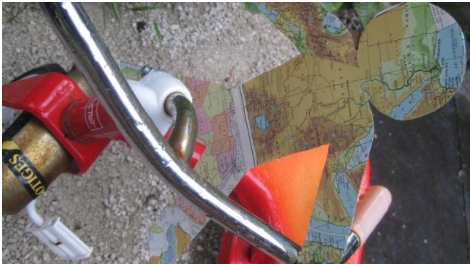 “No one is going to stop human nature from its impulse to shape the mystery that lies about us. Thank the powers that be that we can dream in this sense, that we can send out feelers in the unknown and fly coloured kites into the azure or the storm. It is as natural to fabulate as to breathe, and as necessary… the human heart would suffocate if it were restricted to logic.”
“No one is going to stop human nature from its impulse to shape the mystery that lies about us. Thank the powers that be that we can dream in this sense, that we can send out feelers in the unknown and fly coloured kites into the azure or the storm. It is as natural to fabulate as to breathe, and as necessary… the human heart would suffocate if it were restricted to logic.”
p.74-75 Theopoetics, Amos Niven Wilder
I cried when I first read Wilder’s book Theopoetics for the wild joy and familiar of it because I had never read the words but they were somehow already mine. A truth I didn’t know yet. Theopoetics can be an embodied way of knowing and, I think, another way of being and engaging in the world.
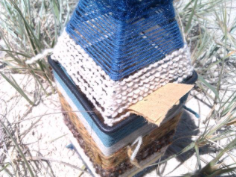 To grieve: I make a representation of the home I’m losing and the home I hope for. A vessel for my hopes, fears and prayers and I carry it. It is outside of my head, small enough to hold in my hands. Colourful, soft and warm – it is not cold and dark – a grief I am able to bear more easily for that.
To grieve: I make a representation of the home I’m losing and the home I hope for. A vessel for my hopes, fears and prayers and I carry it. It is outside of my head, small enough to hold in my hands. Colourful, soft and warm – it is not cold and dark – a grief I am able to bear more easily for that.
To love: A dear friend and I no longer live in the same country. We cannot share in the day to day, nor in the hard times, nor the small graces. Some misunderstanding arose that I could not make right with words in an email and I felt the fragility of time and distance, and a fear I might be losing something very precious. I chose a grand gesture. Something embarrassing, risky, a little stupid and, maybe, just a little bit brave. I went to her work, a public library, wearing prop alien glasses and used the catalogue to find a copy of “How to Make Friends and Influence People” which I proceeded to pretend to read, upside down, moving from place to place in her line of sight around the library. She didn’t notice me. Weird stuff happens in public libraries all the time. You have to go bigger than that if you want a librarian to pay attention to you. I had to yield my melodramatic impulses in favour of the expediency of just talking to her so we could sort it out over lunch. And we do. Two humans talking it through. (Pro tip: People will find it hard to stay mad at you if you make yourself ridiculous).
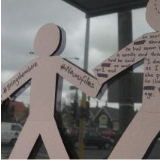 To hope: A Love Makes a Way action to advocate for the release of children from detention centres provides paper doll chains to be signs of our prayers, our fears and our hopes. Leaked documents from the Nauru files reveal the terrible treatment and trauma of women and children held by the Australian government. We blu tack these to the windows at the office of our local politician but first I take a series of photos – these children are sitting with me at the table, playing soccer, at a school, in a playground, riding a bike. Ordinary kid things they don’t get to do but in my hands they can. Hope manifest.
To hope: A Love Makes a Way action to advocate for the release of children from detention centres provides paper doll chains to be signs of our prayers, our fears and our hopes. Leaked documents from the Nauru files reveal the terrible treatment and trauma of women and children held by the Australian government. We blu tack these to the windows at the office of our local politician but first I take a series of photos – these children are sitting with me at the table, playing soccer, at a school, in a playground, riding a bike. Ordinary kid things they don’t get to do but in my hands they can. Hope manifest.
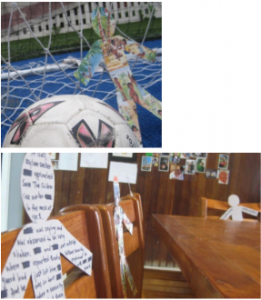 The common thread here was listening. Listening for the eternal breath that connects me to the home I’ve lost and new one I haven’t found yet, the refugees I may never meet and could not directly help, and friends far away. Grace finds a way when it feels like there is no way, creates moves where I feel ‘stuck’, empowers when I feel hopeless. Breathe and pray, you may yet find a way to dream, and shape, to feel and to fly. Breathe and pray.
The common thread here was listening. Listening for the eternal breath that connects me to the home I’ve lost and new one I haven’t found yet, the refugees I may never meet and could not directly help, and friends far away. Grace finds a way when it feels like there is no way, creates moves where I feel ‘stuck’, empowers when I feel hopeless. Breathe and pray, you may yet find a way to dream, and shape, to feel and to fly. Breathe and pray.
By Lynne M. Baab —
What’s your favorite place in nature? A beach, the mountains, a lake, a meadow? What’s your favorite aspect of nature? Flowers, reflective water, a specific kind of animal, a tree?
I’ve been doing a lot of thinking about how we can pray more deeply for God’s creation and how we can feel like we are walking with Jesus when we care for creation. I’ll give you some ideas here, and you can see more of them in the online Lenten devotional I co-wrote for our church last year.
Gratitude and praise. Thankfulness prayers are deeply appropriate – and even foundational – when we pray about God’s creation. We don’t have to look very far to find things to praise and thank God for when we look at the beauty of flowers, trees, hills, mountains, lakes, oceans, clouds, and thousands of other manifestations of God’s creativity and beauty.
Lament. We also don’t have to look very far in God’s creation to feel upset about damage to the beauty of the world God created so intricately and carefully. Lament prayers express sadness, grief, anger and frustration. We tell God what we’re upset about. Lament prayers are appropriate in so many areas when we see or think about environmental degredation.
Confession and assurance of pardon. If you’re like me, and you feel guilt about not engaging in creation care as much as you’d like to, or as much as you’ve felt led to, God invites you to bring those thoughts and feelings into a prayer of confession. God always forgives us and gives us a fresh start.
Intercession. Prayers of intercession for creation are appropriate in so many areas. So many people are involved in aspects of caring for God’s creation. So many people create policy that impacts the earth. Where can we start in our prayers?

By Dave Baab
I’d suggest picking something you love in nature, and think about all the scientists who do research in that area, all the people who are involved in taking care of that part of God’s creation, all the policy makers who make decisions that have an impact on that part of nature, and all the ordinary people whose decisions have an effect on that part of nature you love. Pray for those people and for God’s continued sustenance and care of the beautiful earth.
To deepen prayers for creation care, I suggest reading Psalm 103 and 104, and then praying the words to both psalms. They can be read as a pair, each reflecting one of God’s major roles in human history.
Psalm 103 focuses on God the Redeemer, and if you confess your sins about anything, including not caring for creation as well as you should, you’ll find joy and assurance from God in the words of Psalm 103. If you read it, notice how many nature analogies are used to make the points in the psalm.
Psalm 104 focuses on the way that God sustains the plants and animals. And humans! I find it delightful.
“O Lord, how manifold are your works!
In wisdom you have made them all;
the earth is full of your creatures. . . .
These all look to you
to give them their food in due season;
when you give to them, they gather it up;
when you open your hand, they are filled with good things.” (Psalm 104:23, 27, 28)
Do you feel as though you are living in the midst of a storm? COVID-19 spreading rapidly across the globe. Stock markets crashing as people panic in response. Grocery shelves empty of toilet paper and cleaning supplies. It feels as though a tornado has struck and there is Jesus sleeping peacefully in the back of the boat.
Later that day, after it grew dark, Jesus said to his disciples, “Let’s cross over to the other side of the lake.” After they had sent the crowd away, they shoved off from shore with him, as he had been teaching from the boat,[a] and there were other boats that sailed with them. Suddenly, as they were crossing the lake, a ferocious tempest arose, with violent winds and waves that were crashing into the boat until it was all but swamped. But Jesus was calmly sleeping in the stern, resting on a cushion. So they shook him awake, saying, “Teacher, don’t you even care that we are all about to die!” Fully awake, he rebuked the storm and shouted to the sea, “Hush! Calm down!” All at once the wind stopped howling and the water became perfectly calm.Then he turned to his disciples and said to them, “Why are you so afraid? Haven’t you learned to trust yet?” But they were overwhelmed with fear and awe and said to one another, “Who is this man who has such authority that even the wind and waves obey him?”
This morning as I read through the story of Jesus calming the storm in Mark 4:35-41 something struck me that I had never thought much about before – Jesus was actually deeply asleep in the midst of this storm. Now I lived on a ship for 12 years and I know that it is hard to sleep in the midst of a storm when the ship is rocking and rolling, the waves are crashing and the cargo groans against its bonds threatening to break loose at any moment. We need everyone to help keep the ship on an even keel.
Even now when I live in a stationary home, I know how anxiety can keep me awake, often creating its own storms of fretting, fear and anxiety.
Sleeping in the midst of storms is a sign of extreme stupidity or of supreme confidence.
Jesus’ response when the disciples woke him shows that his sleep was one of confidence. He trusted completely that the God who formed the waters and allowed the storms, the God who called him beloved Son, was still in control and would keep them all safe no matter how violently the waters raged. In the midst of the storm, he was able to find rest and refreshment.
Sometimes I think that we forget that Jesus is in the boat with us.
Sometimes I not sure that we really want to wake him. The storm itself is frightening, Jesus calming of the storm is terrifying.
We are in the midst of stormy times. None of us know what the future holds. We are anxious about losing our jobs and homes. We are not sure if we will have health insurance to cover us if we get ill.
How much confidence do we have that Jesus is in the boat with us? And what would it look like for him to calm this storm? It is so easy for us to pray for the solution we want to see happen. That COVID-19 would disappear quickly. That there will not be another recession as a result of the economic downturn. That those we love will not get sick. It is hard for us to have the faith to believe that whatever God allows to happen in this storm, Jesus is still with us. It is he, not us who is in control.
Yet in the midst of storms good happens and there are signs of hope if we will only look at them.
A woman in Wuhan posted on Facebook a couple of days ago about the good her family has experienced since the lockdown. Here is a glimpse of what she said Her family has spent more time together and they have grown closer as a result. Her prayer life has never been better and she has become aware of the amazing community around her. She can hear the birds that are usually drowned out by traffic noise and the beauty of the spring bursting forth around her is magnificent.
In the midst of storms do you notice only the difficult things? What about the good? What have you already experienced that has been good in the midst of this storm?
My prayer today is that God will calm the storm and that we will be able to find rest and confidence in whatever that calming looks like. May we also notice the good of what God is doing in our midst.
Paul Neeley has put together a post of a variety of prayers that people have written as we face this storm. Take time to read through them and sit still allowing God’s calming presence to fill you.
Yesterday was International Women’s Day, a global celebration of the social, economic, cultural and political achievements of women. As I reflected on this, I was reminded of my own challenges for equal acceptance within society and the church as well as the, often overwhelming obstacles that other women have faced and still face in the battle for freedom.
What Do You Think Of Mary Magdalene?
Mary Magdalene has become one of my favourite New Testament figures. She is also one of the most misused and abused a fitting symbol for women throughout the ages who are still misused abused and blamed. Mary Magdalene was one of Jesus’ most dedicated followers. She was present at his crucifixion and the first to see Jesus after his resurrection. Yet what most of us believe when we think of Mary Magdalene is a “fact” for which there is no evidence. She is remembered as a prostitute rather than as the faithful first bearer of the Good News, whom some would elevate the level of apostle.
Why do we so easily believe this? Part of it is because there are so many Marys mentioned in the New Testament that it is confusing. However, though her prominence in the story of Jesus probably began to deteriorate shortly after her death, the transformation to penitent prostitute was only sealed on Sept. 14, 1591, when Pope Gregory the Great gave a homily in Rome that pronounced that Mary Magdalene, Luke’s unnamed sinner, and Mary of Bethany were, indeed, the same person. And it is easier for a male dominated church to accept a prostitute than a female leader.
We easily forget or ignore the fact that other women too played a prominent part in the leadership of the early church. Sadly as Christianity became more mainstream it also became more patriarchal and the roles of women as disciples, elders and leaders (some even say as apostles) was quickly overlooked or reinterpreted.
We Like to Keep Women In Their Place
We still like to think the worst of women and want them to “keep their place”. Like most women in leadership, I am quite familiar with this. As a young doctor, I was told it was wrong for me as a single woman to earn more than a married man, and I was, on several occasions, refused positions of leadership just because of my gender. Even now, I often feel that when I walk into a gathering of male leaders I may as well be a fly on the wall. I feel as though I have to shout make myself heard.
Yet compared to many women, I have enjoyed amazing acceptance. I still remember the heartfelt cry of one Cambodian refugee I worked with years ago. She told me “My hope is that one day my daughters will have the same freedom you do.”
The church is often at the forefront of abuse and discrimination towards women. When Sarah Bessey started a Twitter conversation using the hashtag, #ThingsOnlyChristianWomenHear in 2017, it took off in a way few expected and the conversation rippled round social media for months even before the #MeToo movement took root. Women shared stories of rape, abuse, and sexism in the church and how the bible was used to justify these things and keep them quiet. Men blamed women for not submitting to their husbands or leaders or just for wearing provocative clothing. “They deserved to be raped”, some said.
More recently, we have all watched the furore in the Southern Baptist church as Beth Moore spoke out about sexism in the church, as well as the often very heated discussions about whether David raped Bathsheba. In his Christianity Today article: Why It Is Easier to Accept David as A Murderer Rather Than A Rapist, Kyle Worley states: We don’t want David to be a rapist. We actually find it easier to stomach him being a murderer of a man than an abuser of a woman. This kind of an attitude seems to pervade both the church and our society in so many ways.
The discussion about pregnancy and health insurance here in the U.S. was the final straw for me. So many inequalities still separate women from men in almost every country in the world and it seems to me that our present political environment exacerbates it. Prior to the Affordable Care Act women often paid more than men for the same health care coverage but health insurance for pregnancy, labor, delivery, and newborn baby care became mandatory in 2014 under Obama’s plan. That could soon change, however, and when women are at their most vulnerable, they could once more be made to suffer financial hardships. It’s not as bad as when masters could impregnate their servants and then throw them out onto the streets but it seems to have some of the same flavor to me.
What Is Your Response?
As you can tell, this is an issue that is very upsetting for me and I pray that you will forgive me. However, I believe that Jesus brings the freedom of equality to all persons and where we see inequality we all need to speak out. As Galatians 3:28 says, There is neither Jew nor Gentile, neither slave nor free, nor is there male and female, for you are all one in Christ Jesus. Biblical scholars have told me that this was one of the creedal texts of the early church, so why do we not believe it? The gender gap is still very obvious not just in our world, but in God’s family.
Prayerfully consider your own response firstly to Mary Magdalene and Bathsheba, then to women in your life. Are there misconceptions in your views of them? Are there ways in which you discriminate against women by not treating them as equals? How would God have you respond.
This beautiful and compelling rendition of the Lord’s prayer was posted by the Society of the Sacred Heart. I thought that it made a great addition to our Lenten collection of prayers.
Our God who is in heaven,
And all of us here on earth;
The hungry, the oppressed, the excluded.
Holy is your name.
May your reign come.
May your reign come and your will be done:
In our choice to struggle with the complexities of this world,
And to confront greed and the desire for power in our selves,
In our nation and in the global community.
May your reign come.
Give us this day our daily bread;
Bread that we are called to share,
Bread that you have given us abundantly
And that we must distribute fairly, ensuring security for all.
May your reign come.
Forgive us our trespasses;
Times we have turned away from the struggles
Of other people and countries,
Times when we have thought only of our own security.
May your reign come.
Lead us not into temptation;
The temptation to close our minds, ears, and eyes
To the unfair global systems that create
Larger and larger gaps between the rich and the poor;
The temptation to think it is too difficult
To bring about more just alternatives.
May your reign come.
Deliver us from evil;
The evil of a world where violence happens in your name,
Where wealth for a few us more important
Than economic rights for all,
Where gates and barriers between people
Are so hard to bring down
May your reign come.
May your reign come, for yours is the kingdom,
the power and the glory forever and ever. AMEN!
As an Amazon Associate, I receive a small amount for purchases made through appropriate links.
Thank you for supporting Godspace in this way.
When referencing or quoting Godspace Light, please be sure to include the Author (Christine Sine unless otherwise noted), the Title of the article or resource, the Source link where appropriate, and ©Godspacelight.com. Thank you!

